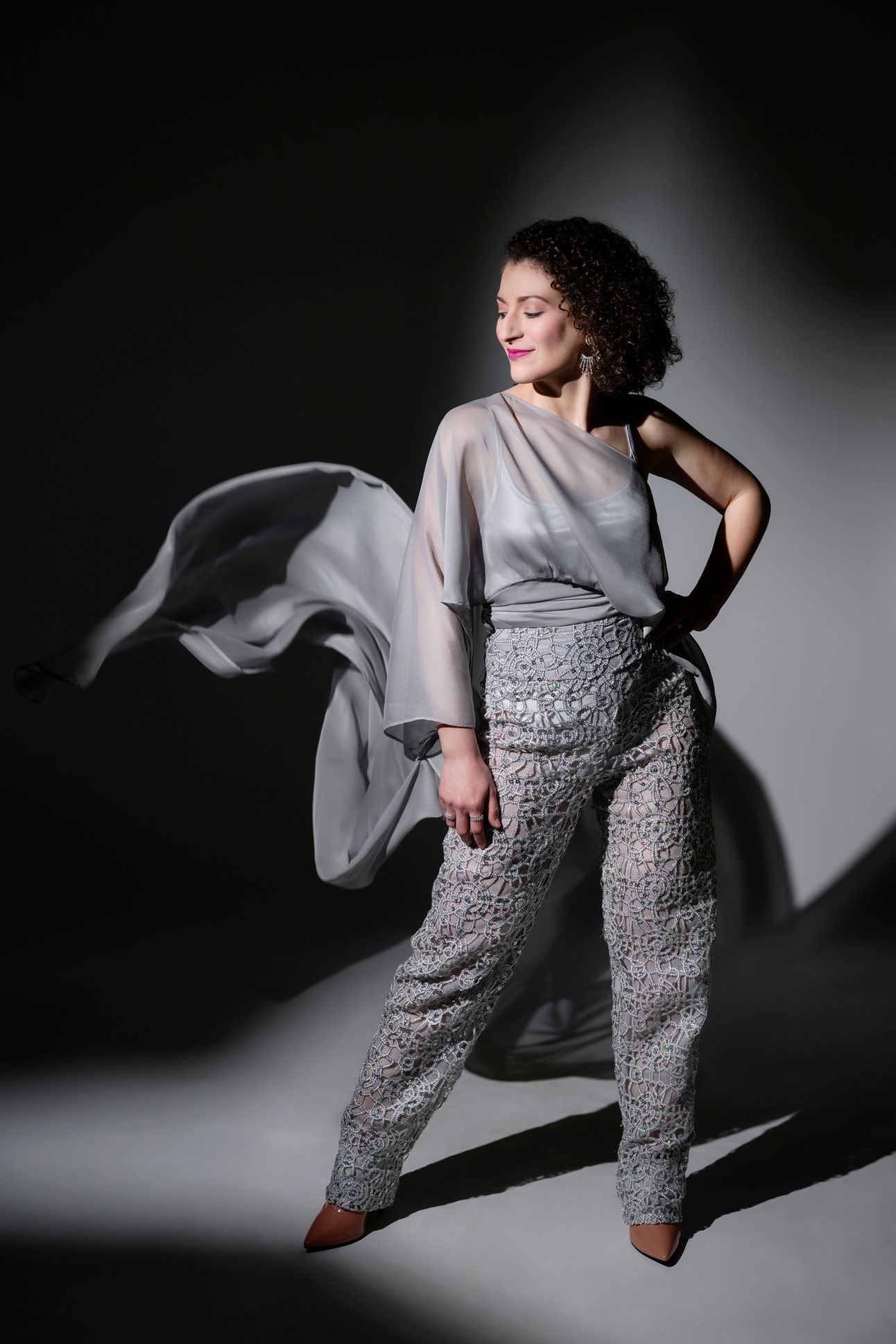
March Digital Cover story presented by Life in Indy
Ivory Girl: Pianist Clare Longendyke Brings Innovative Musical Experiences to Public Places

Apparel by Angel Oliviera Couture
Like a lot of kids, Clare Longendyke first started taking piano lessons in elementary school. Unlike most kids, Longendyke was already playing by ear, so to say she showed promise at an early age would be something of an understatement.
Now at thirty-seven, Longendyke holds a Master’s and Doctor of Music from the Indiana University Jacobs School of Music and is an artist-in-residence at the Rose-Hulman Institute of Technology. She has founded a music festival, performed with NPR’s Performance Today, led workshops and masterclasses nationwide, and she just released debut album, …of dreams unveiled. All while managing to squeeze in around fifty concerts a year.
It’s our opinion that Longendyke is the definition of a professional, classical pianist. And she’s always looking for new groups to play with. (Looking at you, ISO. ;))
Last week, we opened our doors for folks to shadow a photo shoot and live interview with Longendyke. If you weren’t there, here’s a taste of what you missed!

Photography by Christopher Whonsetler; Style by Katie Marple; Hair and Makeup by Nikki Brown; Skirt by Beth Bennett; Shirt and earrings provided by stylist
Polina Osherov: You are super accomplished. You're a doctor of music, for crying out loud. You've performed all over the world. You’ve taught at the university level. And now you’re releasing your first album and you’re only thirty-seven! What’s that like for you?
Clare Longendyke: It's funny. Men call me intense. Women talk about my perseverance and my grit. I prefer to look at it as perseverance and grit. It's taken thousands of hours of practice. Thousands of hours of getting to know this big, black wooden box with eighty-eight keys.
And then, of course, I don't perform on my home piano, so it's learning how to be a chameleon and to adapt to all sorts of circumstances and whether that's an unresponsive audience and having to really wake them up, or whether that's an audience that doesn't really care about classical music or whether that's a really difficult composition. I'm an entertainer, no matter how you slice it.
PO: Going into any kind of an arts job seems risky in terms of sustainability.. What was your calculus on that? You knew you were good, you knew you loved it, but did it feel like a long shot to you at all?
CL: I was just like, this is what I want to do, and I'm going to figure it out. And that's who I am. I don't hear the word “no.” And I think that's what draws people to me. So I'm a Gemini, and I know nothing about astrology except for how it relates to me. And as this apparently two-faced human being, people either love me and we're friends for life, or they hate me. Like, they don't even get to know me, and they hate me.
PO: Yep. I can relate a little bit.
CL: Well, you're an incredibly accomplished woman in an arts field in Indianapolis, and I know what that means. It takes a lot.
PO: Not knowing what you're getting into is helpful. [Laughter.] So there’s an aspect of feeling like you're good at a thing and also being excited about it. But it's more than that, right? There's an element of luck that comes into it.

CL: Absolutely. Absolutely. It’s also about putting yourself in the right place at the right time. I have an example of that. There's an orchestra in Iowa that I really want to play with. And so I gave myself a reason to go to this orchestra’s town by setting up a radio interview for myself promoting the release of my debut solo CD. I drove five hours on a weekend when I knew there was an orchestra concert, for the sole purpose of shaking the hand of the conductor of this orchestra.
Then, two days ago, I played with an orchestra in Minnesota with one of the conductor’s former students. The conductor came to the concert at the invitation of this former student because he now knew me and he wanted to hear me play, to consider me for future concerts. There is luck in that, of course. But I also did my part to make it happen.
PO: By going the extra mile, you made yourself a bigger target for luck. Love it when the extra hustle pays off like that.
I know we wanted to give the audience a chance to ask some questions, so I’ll open the floor for that now.
Selena: What is your favorite genres of music or artists other than classical music?
CL: I'm super inspired by great singers across any genre but specifically Whitney Houston and Bonnie Raitt. The ability to move people with the human voice is a really powerful thing. And there's something about a truly unique human voice that we just don't get anymore.
I feel like that ended in the age of singers like Natalie Merchant and Jewel, Alanis Morissette and Fiona Apple. They were saying something with the way that they manipulated their voice as an instrument. And in the same way that I don't have the same touch when I play Beethoven as when I play Debussy, the way that they are using their instrument and their bodies is fascinating to me.

Dress by Catherine Fritsch

Emily: What's the biggest piece of advice you would give someone who comes to you and says, “I'm pursuing a creative career,” whether it's piano or something else?
CL: So, I know that this is hard advice, but I would tell them to absolutely make sure that what other people are telling you is talent actually stacks up in the artistic field that you are looking to go into. Audiences don't have the level of cultivation of education, or wherewithal, to know what is truly good. Just because people like it on social media doesn’t necessarily mean you’re good enough to make a career out of it.
And that's not to say that you can't improve your skills. I have a doctorate in piano performance, and I still practice twenty to thirty-five hours a week.
PO: That is hard advice for sure. But I think there's an argument to be made that even if you don't end up the best, if you work really hard, you're still going to benefit from all the experiences and bring value. And so I think that it's important that as young people think about moving forward and finding careers, that they're not discouraged by perhaps an early recognition that they might not end up being the world's best. Plus you just never know, right? You don’t want to quit too early.
CL: It's so hard to know. That's why mentors are really important. A good mentor is never going to tell you that you can't accomplish your goals and dreams, but they can offer insights and advice, be a great sounding board and provide reality checks when needed.
PO: I’d love to hear a little bit about your Rose-Hulman residency before you go.
CL: Oh, my gosh, there’s so much to say about that! I've become friends with the curator at Rose-Hulman which of course has a fantastic art collection, and part of my platform has been curating their Discovery Music Series. On April 17th, I'm branching out and I'm playing a concert of entirely video game music. It's like a fantasy concert where people get to imagine themselves in the world of the video game as I'm playing. I think that is my platform. Take yourself out of your body and get into the music enough to really just let yourself go. Have I ever played a video game in my life? Never. Am I excited about this concert? You bet your ass I am.
PO: That's so cool.
CL: Yeah. So that's my residency at Rose-Hulman. That's me.
PO: Thank you. Thank you so much for sharing, Clare.
CL: It's such a pleasure to be here. Thank you for this.

Stay Connected

PATTERN is a 501(c)(3) public charity. Your donations make our work possible.
Subscribe to our Print Magazine and support creatives across the state.
Love our work? Hire us! We’re obsessed with storytelling and design. Email [email protected] with details for a quote.
This story was made possible thanks to the generous support of our friends at Life in Indy.

